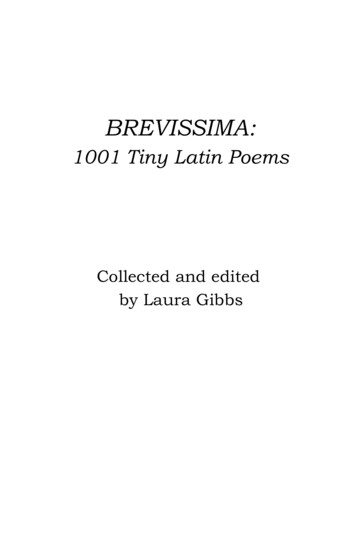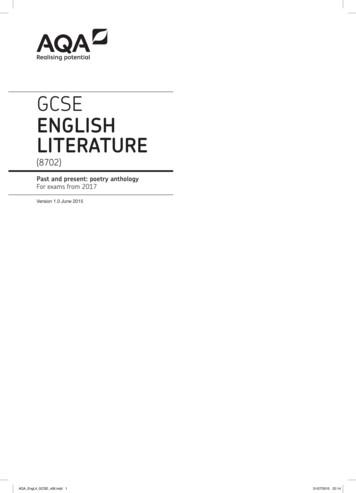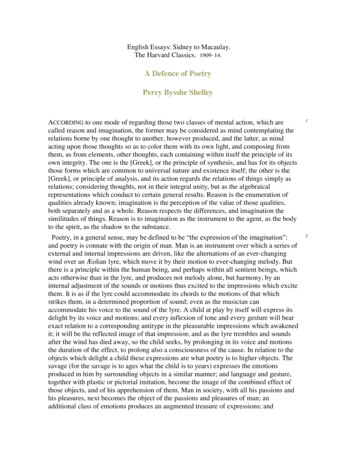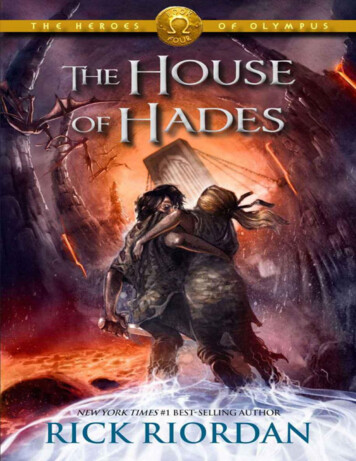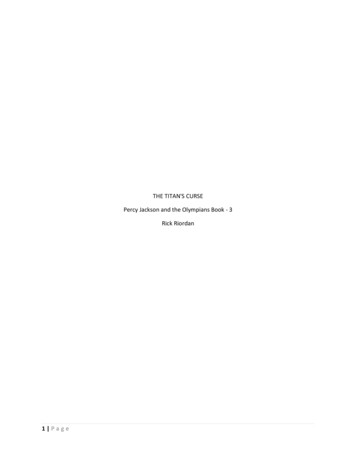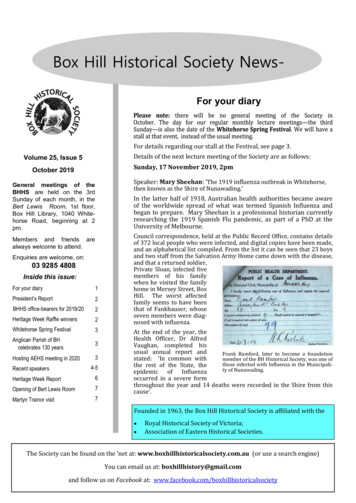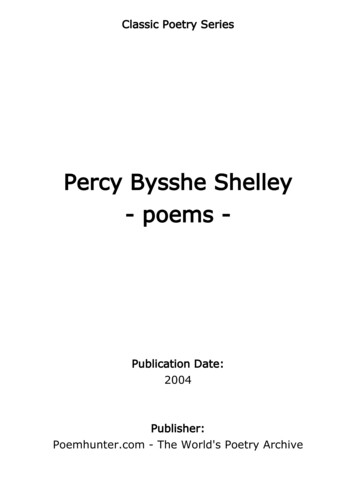
Transcription
Classic Poetry SeriesPercy Bysshe Shelley- poems -Publication Date:2004Publisher:Poemhunter.com - The World's Poetry Archive
Percy Bysshe Shelley(1792-1822)Shelley, born the heir to rich estates and the son of an Member of Parliament,went to University College, Oxford in 1810, but in March of the following year heand a friend, Thomas Jefferson Hogg, were both expelled for the suspectedauthorship of a pamphlet entitled The Necessity of Atheism.In 1811 he met and eloped to Edinburgh with Harriet Westbrook and, one yearlater, went with her and her older sister first to Dublin, then to Devon and NorthWales, where they stayed for six months into 1813. However, by 1814, and withthe birth of two children, their marriage had collapsed and Shelley eloped onceagain, this time with Mary Godwin.Along with Mary's step-sister, the couple travelled to France, Switzerland andGermany before returning to London where he took a house with Mary on theedge of Great Windsor Park and wrote Alastor (1816), the poem that firstbrought him fame.In 1816 Shelley spent the summer on Lake Geneva with Byron and Mary whohad begun work on her Frankenstein. In the autumn of that year Harriet drownedherself in the Serpentine in Hyde Park and Shelley then married Mary and settledwith her, in 1817, at Great Marlow, on the Thames. They later travelled to Italy,where Shelley wrote the sonnet Ozymandias (written 1818) and translatedPlato's Symposium from the Greek. Shelley himself drowned in a sailing accidentin 1822.www.PoemHunter.com - The World's Poetry Archive1
A Bridal SongI.The golden gates of Sleep unbarWhere Strength and Beauty, met together,Kindle their image like a starIn a sea of glassy weather!Night, with all thy stars look down,-Darkness, weep thy holiest dew,-Never smiled the inconstant moonOn a pair so true.Let eyes not see their own delight;-Haste, swift Hour, and thy flightOft renew.II.Fairies, sprites, and angels, keep her!Holy stars, permit no wrong!And return to wake the sleeper,Dawn,—ere it be long!O joy! O fear! what will be doneIn the absence of the sun!Come along!Percy Bysshe Shelleywww.PoemHunter.com - The World's Poetry Archive2
A DialogueDEATH:For my dagger is bathed in the blood of the brave,I come, care-worn tenant of life, from the grave,Where Innocence sleeps 'neath the peace-giving sod,And the good cease to tremble at Tyranny's nod;I offer a calm habitation to thee,-Say, victim of grief, wilt thou slumber with me?My mansion is damp, cold silence is there,But it lulls in oblivion the fiends of despair;Not a groan of regret, not a sigh, not a breath,Dares dispute with grim Silence the empire of Death.I offer a calm habitation to thee,-Say, victim of grief, wilt thou slumber with me?MORTAL:Mine eyelids are heavy; my soul seeks repose,It longs in thy cells to embosom its woes,It longs in thy cells to deposit its load,Where no longer the scorpions of Perfidy goad,-Where the phantoms of Prejudice vanish away,And Bigotry's bloodhounds lose scent of their prey.Yet tell me, dark Death, when thine empire is o'er,What awaits on Futurity's mist-covered shore?DEATH:Cease, cease, wayward Mortal! I dare not unveilThe shadows that float o'er Eternity's vale;Nought waits for the good but a spirit of Love,That will hail their blest advent to regions above.For Love, Mortal, gleams through the gloom of my sway,And the shades which surround me fly fast at its ray.Hast thou loved?--Then depart from these regions of hate,And in slumber with me blunt the arrows of fate.I offer a calm habitation to thee.-Say, victim of grief, wilt thou slumber with me?MORTAL:Oh! sweet is thy slumber! oh! sweet is the rayWhich after thy night introduces the day;www.PoemHunter.com - The World's Poetry Archive3
How concealed, how persuasive, self-interest’s breath,Though it floats to mine ear from the bosom of Death!I hoped that I quite was forgotten by all,Yet a lingering friend might be grieved at my fall,And duty forbids, though I languish to die,When departure might heave Virtue’s breast with a sigh.O Death! O my friend! snatch this form to thy shrine,And I fear, dear destroyer, I shall not repine.Percy Bysshe Shelleywww.PoemHunter.com - The World's Poetry Archive4
A DirgeRough wind, that moanest loudGrief too sad for song;Wild wind, when sullen cloudKnells all the night long;Sad storm whose tears are vain,Bare woods, whose branches strain,Deep caves and dreary main,-Wail, for the world’s wrong!Percy Bysshe Shelleywww.PoemHunter.com - The World's Poetry Archive5
A Fragment: To MusicSilver key of the fountain of tears,Where the spirit drinks till the brain is wild;Softest grave of a thousand fears,Where their mother, Care, like a drowsy child,Is laid asleep in flowers.Percy Bysshe Shelleywww.PoemHunter.com - The World's Poetry Archive6
A Hate-SongA hater he came and sat by a ditch,And he took an old cracked lute;And he sang a song which was more of a screech'Gainst a woman that was a brute.Percy Bysshe Shelleywww.PoemHunter.com - The World's Poetry Archive7
A LamentO World! O Life! O Time!On whose last steps I climb,Trembling at that where I had stood before;When will return the glory of your prime?No more -Oh, never more!Out of the day and nightA joy has taken flight:Fresh spring, and summer, and winter hoarMove my faint heart with grief, but with delightNo more -Oh, never more!Percy Bysshe Shelleywww.PoemHunter.com - The World's Poetry Archive8
A New National AnthemI.God prosper, speed,and save,God raise from England’s graveHer murdered Queen!Pave with swift victoryThe steps of Liberty,Whom Britons own to beImmortal Queen.II.See, she comes throned on high,On swift Eternity!God save the Queen!Millions on millions wait,Firm, rapid, and elate,On her majestic state!God save the Queen!III.She is Thine own pure soulMoulding the mighty whole,-God save the Queen!She is Thine own deep loveRained down from Heaven above,-Wherever she rest or move,God save our Queen!IV.‘Wilder her enemiesIn their own dark disguise,-God save our Queen!All earthly things that dareHer sacred name to bear,Strip them, as kings are, bare;God save the Queen!V.Be her eternal throneBuilt in our hearts alone--www.PoemHunter.com - The World's Poetry Archive9
God save the Queen!Let the oppressor holdCanopied seats of gold;She sits enthroned of oldO’er our hearts Queen.VI.Lips touched by seraphimBreathe out the choral hymn‘God save the Queen!’Sweet as if angels sang,Loud as that trumpet’s clangWakening the world’s dead gang,-God save the Queen!Percy Bysshe Shelleywww.PoemHunter.com - The World's Poetry Archive10
A Roman's ChamberI.In the cave which wild weeds coverWait for thine aethereal lover;For the pallid moon is waning,O'er the spiral cypress hangingAnd the moon no cloud is staining.II.It was once a Roman’s chamber,Where he kept his darkest revels,And the wild weeds twine and clamber;It was then a chasm for devils.Percy Bysshe Shelleywww.PoemHunter.com - The World's Poetry Archive11
A Serpent-FaceHis face was like a snake's -- wrinkled and looseAnd withered-Percy Bysshe Shelleywww.PoemHunter.com - The World's Poetry Archive12
A Summer Evening Churchyard, Lechlade,GloucestershireTHE wind has swept from the wide atmosphereEach vapour that obscured the sunset's ray,And pallid Evening twines its beaming hairIn duskier braids around the languid eyes of Day:Silence and Twilight, unbeloved of men,Creep hand in hand from yon obscurest glen.They breathe their spells towards the departing day,Encompassing the earth, air, stars, and sea;Light, sound, and motion, own the potent sway,Responding to the charm with its own mystery.The winds are still, or the dry church-tower grassKnows not their gentle motions as they pass.Thou too, aerial pile, whose pinnaclesPoint from one shrine like pyramids of fire,Obey'st I in silence their sweet solemn spells,Clothing in hues of heaven thy dim and distant spire,Around whose lessening and invisible heightGather among the stars the clouds of night.The dead are sleeping in their sepulchres:And, mouldering as they sleep, a thrilling sound,Half sense half thought, among the darkness stirs,Breathed from their wormy beds all living things around,And, mingling with the still night and mute sky,Its awful hush is felt inaudibly.Thus solemnized and softened, death is mildAnd terrorless as this serenest night.Here could I hope, like some enquiring childSporting on graves, that death did hide from human sightSweet secrets, or beside its breathless sleepThat loveliest dreams perpetual watch did keep.Percy Bysshe Shelleywww.PoemHunter.com - The World's Poetry Archive13
A Tale Of Society As It Is: From Facts, 1811I.She was an aged woman; and the yearsWhich she had numbered on her toilsome wayHad bowed her natural powers to decay.She was an aged woman; yet the rayWhich faintly glimmered through her starting tears,Pressed into light by silent misery,Hath soul's imperishable energy.She was a cripple, and incapableTo add one mite to gold-fed luxury:And therefore did her spirit dimly feelThat poverty, the crime of tainting stain,Would merge her in its depths, never to rise again.II.One only son's love had supported her.She long had struggled with infirmity,Lingering to human life-scenes; for to die,When fate has spared to rend some mental tie,Would many wish, and surely fewer dare.But, when the tyrant's bloodhounds forced the childFor his cursed power unhallowed arms to wield-Bend to another's will--become a thingMore senseless than the sword of battlefield-Then did she feel keen sorrow's keenest sting;And many years had passed ere comfort they would bring.III.For seven years did this poor woman liveIn unparticipated solitude.Thou mightst have seen her in the forest rudePicking the scattered remnants of its wood.If human, thou mightst then have learned to grieve.The gleanings of precarious charityHer scantiness of food did scarce supply.The proofs of an unspeaking sorrow dweltWithin her ghastly hollowness of eye:Each arrow of the season's change she felt.Yet still she groans, ere yet her race were run,www.PoemHunter.com - The World's Poetry Archive14
One only hope: it was—once more to see her son.IV.It was an eve of June, when every starSpoke peace from Heaven to those on earth that live.She rested on the moor. 'Twas such an eveWhen first her soul began indeed to grieve:Then he was here; now he is very far.The sweetness of the balmy eveningA sorrow o'er her aged soul did fling,Yet not devoid of rapture’s mingled tear:A balm was in the poison of the sting.This aged sufferer for many a yearHad never felt such comfort. She suppressedA sigh--and turning round, clasped William to her breast!V.And, though his form was wasted by the woeWhich tyrants on their victims love to wreak,Though his sunk eyeballs and his faded cheekOf slavery's violence and scorn did speak,Yet did the aged woman's bosom glow.The vital fire seemed re-illumed withinBy this sweet unexpected welcoming.Oh, consummation of the fondest hopeThat ever soared on Fancy's wildest wing!Oh, tenderness that foundst so sweet a scope!Prince who dost pride thee on thy mighty sway,When THOU canst feel such love, thou shalt be great as they!VI.Her son, compelled, the country's foes had fought,Had bled in battle; and the stern controlWhich ruled his sinews and coerced his soulUtterly poisoned life's unmingled bowl,And unsubduable evils on him brought.He was the shadow of the lusty childWho, when the time of summer season smiled,Did earn for her a meal of honesty,And with affectionate discourse beguiledThe keen attacks of pain and poverty;Till Power, as envying her this only joy,www.PoemHunter.com - The World's Poetry Archive15
From her maternal bosom tore the unhappy boy.VII.And now cold charity's unwelcome doleWas insufficient to support the pair;And they would perish rather than would bearThe law's stern slavery, and the insolent stareWith which law loves to rend the poor man's soul-The bitter scorn, the spirit-sinking noiseOf heartless mirth which women, men, and boysWake in this scene of legal misery.Percy Bysshe Shelleywww.PoemHunter.com - The World's Poetry Archive16
AdonaisI weep for Adonais -he is dead!O, weep for Adonais! though our tearsThaw not the frost which binds so dear a head!And thou, sad Hour, selected from all yearsTo mourn our loss, rouse thy obscure compeers,And teach them thine own sorrow, say: "With meDied Adonais; till the Future daresForget the Past, his fate and fame shall beAn echo and a light unto eternity!"Where wert thou, mighty Mother, when he lay,When thy Son lay, pierced by the shaft which fliesIn darkness? where was lorn UraniaWhen Adonais died? With veiled eyes,Mid listening Echoes, in her ParadiseShe sate, while one, with soft enamoured breath,Rekindled all the fading melodiesWith which, like flowers that mock the corse beneath,He had adorned and hid the coming bulk of death.O, weep for Adonais -he is dead!Wake, melancholy Mother, wake and weep!Yet wherefore? Quench within their burning bedThy fiery tears, and let thy loud heart keepLike his, a mute and uncomplaining sleep;For he is gone, where all things wise and fairDescend; -oh, dream not that the amorous DeepWill yet restore him to the vital air;Death feeds on his mute voice, and laughs at our despair.Most musical of mourners, weep again!Lament anew, Urania! -He died,Who was the Sire of an immortal strain,Blind, old, and lonely, when his country's pride,The priest, the slave, and the liberticideTrampled and mocked with many a loathed riteOf lust and blood; he went, unterrified,Into the gulf of death; but his clear SpriteYet reigns o'er earth; the third among the sons of light.www.PoemHunter.com - The World's Poetry Archive17
Most musical of mourners, weep anew!Not all to that bright station dared to climb;And happier they their happiness who knew,Whose tapers yet burn through that night of timeIn which suns perished; others more sublime,Struck by the envious wrath of man or god,Have sunk, extinct in their refulgent prime;And some yet live, treading the thorny roadWhich leads, through toil and hate, to Fame's serene abode.But now, thy youngest, dearest one, has perished The nursling of thy widowhood, who grew,Like a pale flower by some sad maiden cherished,And fed with true-love tears, instead of dew;Most musical of mourners, weep anew!Thy extreme hope, the loveliest and the last,The bloom, whose petals nipped before they blewDied on the promise of the fruit, is waste;The broken lily lies -the storm is overpast.To that high Capital, where kingly DeathKeeps his pale court in beauty and decay,He came; and bought, with price of purest breath,A grave among the eternal. -Come away!Haste, while the vault of blue Italian dayIs yet his fitting charnel-roof! while stillHe lies, as if in dewy sleep he lay;Awake him not! surely he takes his fillOf deep and liquid rest, forgetful of all ill.He will awake no more, oh, never more! Within the twilight chamber spreads apaceThe shadow of white Death, and at the doorInvisible Corruption waits to traceHis extreme way to her dim dwelling-place;The eternal Hunger sits, but pity and aweSoothe her pale rage, nor dares she to defaceSo fair a prey, till darkness, and the lawOf change, shall o'er his sleep the mortal curtain draw.O, weep for Adonais! -The quick Dreams,www.PoemHunter.com - The World's Poetry Archive18
The passion-winged Ministers of thought,Who were his flocks, whom near the living streamsOf his young spirit he fed, and whom he taughtThe love which was its music, wander not, Wander no more, from kindling brain to brain,But droop there, whence they sprung; and mourn their lotRound the cold heart, where, after their sweet pain,They ne'er will gather strength, or find a home again.And one with trembling hands clasps his cold head,And fans him with her moonlight wings, and cries,"Our love, our hope, our sorrow, is not dead;See, on the silken fringe of his faint eyes,Like dew upon a sleeping flower, there liesA tear some Dream has loosened from his brain."Lost Angel of a ruined Paradise!She knew not 'twas her own; as with no stainShe faded, like a cloud which had outwept its rain.One from a lucid urn of starry dewWashed his light limbs as if embalming them;Another clipped her profuse locks, and threwThe wreath upon him, like an anadem,Which frozen tears instead of pearls begem;Another in her wilful grief would breakHer bow and winged reeds, as if to stemA greater loss with one which was more weak;And dull the barbed fire against his frozen cheek.Another Splendour on his mouth alit,That mouth, whence it was wont to draw the breathWhich gave it strength to pierce the guarded wit,And pass into the panting heart beneathWith lightning and with music: the damp deathQuenched its caress upon his icy lips;And, as a dying meteor stains a wreathOf moonlight vapour, which the cold night clips,It flushed through his pale limbs, and passed to its eclipse.And others came. Desires and Adorations,Winged Persuasions and veiled Destinies,Splendours, and Glooms, and glimmering Incarnationswww.PoemHunter.com - The World's Poetry Archive19
Of hopes and fears, and twilight Phantasies;And Sorrow, with her family of Sighs,And Pleasure, blind with tears, led by the gleamOf her own dying smile instead of eyes,Came in slow pomp; -the moving pomp might seemLike pageantry of mist on an autumnal stream.All he had loved, and moulded into thought,From shape, and hue, and odour, and sweet sound,Lamented Adonais. Morning soughtHer eastern watch-tower, and her hair unbound,Wet with the tears which should adorn the ground,Dimmed the aereal eyes that kindle day;Afar the melancholy thunder moaned,Pale Ocean in unquiet slumber lay,And the wild Winds flew round, sobbing in their dismay.Lost Echo sits amid the voiceless mountains,And feeds her grief with his remembered lay,And will no more reply to winds or fountains,Or amorous birds perched on the young green spray,Or herdsman's horn, or bell at closing day;Since she can mimic not his lips, more dearThan those for whose disdain she pined awayInto a shadow of all sounds: -a drearMurmur, between their songs, is all the woodmen hear.Grief made the young Spring wild, and she threw downHer kindling buds, as if she Autumn were,Or they dead leaves; since her delight is flown,For whom should she have waked the sullen year?To Phoebus was not Hyacinth so dearNor to himself Narcissus, as to bothThou, Adonais: wan they stand and sereAmid the faint companions of their youth,With dew all turned to tears; odour, to sighing ruth.Thy spirit's sister, the lorn nightingaleMourns not her mate with such melodious pain;Not so the eagle, who like thee could scaleHeaven, and could nourish in the sun's domainHer mighty youth with morning, doth complain,www.PoemHunter.com - The World's Poetry Archive20
Soaring and screaming round her empty nest,As Albion wails for thee: the curse of CainLight on his head who pierced thy innocent breast,And scared the angel soul that was its earthly guest!Ah, woe is me! Winter is come and gone,But grief returns with the revolving year;The airs and streams renew their joyous tone;The ants, the bees, the swallows reappear;Fresh leaves and flowers deck the dead Season's bier;The amorous birds now pair in every brake,And build their mossy homes in field and brere;And the green lizard, and the golden snake,Like unimprisoned flames, out of their trance awake.Through wood and stream and field and hill and OceanA quickening life from the Earth's heart has burstAs it has ever done, with change and motion,From the great morning of the world when firstGod dawned on Chaos; in its stream immersed,The lamps of Heaven flash with a softer light;All baser things pant with life's sacred thirst;Diffuse themselves; and spend in love's delightThe beauty and the joy of their renewed might.The leprous corpse, touched by this spirit tender,Exhales itself in flowers of gentle breath;Like incarnations of the stars, when splendourIs changed to fragrance, they illumine deathAnd mock the merry worm that wakes beneath;Nought we know, dies. Shall that alone which knowsBe as a sword consumed before the sheathBy sightless lightning? -the intense atom glowsA moment, then is quenched in a most cold repose.Alas! that all we loved of him should be,But for our grief, as if it had not been,And grief itself be mortal! Woe is me!Whence are we, and why are we? of what sceneThe actors or spectators? Great and meanMeet massed in death, who lends what life must borrow.As long as skies are blue, and fields are green,www.PoemHunter.com - The World's Poetry Archive21
Evening must usher night, night urge the morrow,Month follow month with woe, and year wake year to sorrow.He will awake no more, oh, never more!"Wake thou," cried Misery, "childless Mother, riseOut of thy sleep, and slake, in thy heart's core,A wound more fierce than his with tears and sighs."And all the Dreams that watched Urania's eyes,And all the Echoes whom their sister's songHad held in holy silence, cried: "Arise!"Swift as a Thought by the snake Memory stung,From her ambrosial rest the fading Splendour sprung.She rose like an autumnal Night, that springsOur of the East, and follows wild and drearThe golden Day, which, on eternal wings,Even as a ghost abandoning a bier,Had left the Earth a corpse. Sorrow and fearSo struck, so roused, so rapt Urania;So saddened round her like an atmosphereOf stormy mist; so swept her on her wayEven to the mournful place where Adonais lay.Our of her secret Paradise she sped,Through camps and cities rough with stone, and steel,And human hearts, which to her aery treadYielding not, wounded the invisiblePalms of her tender feet where'er they fell:And barbed tongues, and thoughts more sharp than they,Rent the soft Form they never could repel,Whose sacred blood, like the young tears of May,Paved with eternal flowers that undeserving way.In the death-chamber for a moment Death,Shamed by the presence of that living Might,Blushed to annihilation, and the breathRevisited those lips, and Life's pale lightFlashed through those limbs, so late her dear delight."Leave me not wild and drear and comfortless,As silent lightning leaves the starless night!Leave me not!" cried Urania: her distressRoused Death: Death rose and smiled, and met her vain caress.www.PoemHunter.com - The World's Poetry Archive22
"'Stay yet awhile! speak to me once again;Kiss me, so long but as a kiss may live;And in my heartless breast and burning brainThat word, that kiss, shall all thoughts else survive,With food of saddest memory kept alive,Now thou art dead, as if it were a partOf thee, my Adonais! I would giveAll that I am to be as thou now art!But I am chained to Time, and cannot thence depart!"O gentle child, beautiful as thou wert,Why didst thou leave the trodden paths of menToo soon, and with weak hands though mighty heartDare the unpastured dragon in his den?Defenceless as thou wert, oh, where was thenWisdom the mirrored shield, or scorn the spear?Or hadst thou waited the full cycle, whenThy spirit should have filled its crescent sphere,The monsters of life's waste had fled from thee like deer."The herded wolves, bold only to pursue;The obscene ravens, clamorous o'er the dead;The vultures to the conqueror's banner trueWho feed where Desolation first has fed,And whose wings rain contagion; -how they fled,When, like Apollo, from his golden bowThe Pythian of the age one arrow spedAnd smiled! -The spoilers tempt no second blow,They fawn on the proud feet that spurn them lying low."The sun comes forth, and many reptiles spawn;He sets, and each ephemeral insect thenIs gathered into death without a dawn,And the immortal stars awake again;So is it in the world of living men:A godlike mind soars forth, in its delightMaking earth bare and veiling heaven, and whenIt sinks, the swarms that dimmed or shared its lightLeave to its kindred lamps the spirit's awful night."Thus ceased she: and the mountain shepherds came,www.PoemHunter.com - The World's Poetry Archive23
Their garlands sere, their magic mantles rent;The Pilgrim of Eternity, whose fameOver his living head like Heaven is bent,An early but enduring monument,Came, veiling all the lightnings of his songIn sorrow; from her wilds Irene sentThe sweetest lyrist of her saddest wrong,And Love taught Grief to fall like music from his tongue.Midst others of less note, came one frail Form,A phantom among men; companionlessAs the last cloud of an expiring stormWhose thunder is its knell; he, as I guess,Had gazed on Nature's naked loveliness,Actaeon-like, and now he fled astrayWith feeble steps o'er the world's wilderness,And his own thoughts, along that rugged way,Pursued, like raging hounds, their father and their prey.A pardlike Spirit beautiful and swift A Love in desolation masked; -a PowerGirt round with weakness; -it can scarce upliftThe weight of the superincumbent hour;It is a dying lamp, a falling shower,A breaking billow; -even whilst we speakIs it not broken? On the withering flowerThe killing sun smiles brightly: on a cheekThe life can burn in blood, even while the heart may break.His head was bound with pansies overblown,And faded violets, white, and pied, and blue;And a light spear topped with a cypress cone,Round whose rude shaft dark ivy-tresses grewYet dripping with the forest's noonday dew,Vibrated, as the ever-beating heartShook the weak hand that grasped it; of that crewHe came the last, neglected and apart;A herd-abandoned deer struck by the hunter's dart.All stood aloof, and at his partial moanSmiled through their tears; well knew that gentle bandWho in another's fate now wept his own,www.PoemHunter.com - The World's Poetry Archive24
As in the accents of an unknown landHe sung new sorrow; sad Urania scannedThe Stranger's mien, and murmured: "Who art thou?"He answered not, but with a sudden handMade bare his branded and ensanguined brow,Which was like Cain's or Christ's -oh! that it should be so!What softer voice is hushed over the dead?Athwart what brow is that dark mantle thrown?What form leans sadly o'er the white death-bed,In mockery of monumental stone,The heavy heart heaving without a moan?If it be He, who, gentlest of the wise,Taught, soothed, loved, honoured the departed one,Let me not vex, with inharmonious sighs,The silence of that heart's accepted sacrifice.Our Adonais has drunk poison -oh!What deaf and viperous murderer could crownLife's early cup with such a draught of woe?The nameless worm would now itself disown:It felt, yet could escape, the magic toneWhose prelude held all envy, hate, and wrong,But what was howling in one breast alone,Silent with expectation of the song,Whose master's hand is cold, whose silver lyre unstrung.Live thou, whose infamy is not thy fame!Live! fear no heavier chastisement from me,Thou noteless blot on a remembered name!But be thyself, and know thyself to be!And ever at thy season be thou freeTo spill the venom when thy fangs o'erflow:Remorse and Self-contempt shall cling to thee;Hot Shame shall burn upon thy secret brow,And like a beaten hound tremble thou shalt -as now.Nor let us weep that our delight is fledFar from these carrion kites that scream below;He wakes or sleeps with the enduring dead;Thou canst not soar where he is sitting now Dust to the dust! but the pure spirit shall flowwww.PoemHunter.com - The World's Poetry Archive25
Back to the burning fountain whence it came,A portion of the Eternal, which must glowThrough time and change, unquenchably the same,Whilst thy cold embers choke the sordid hearth of shame.Peace, peace! he is not dead, he doth not sleep He hath awakened from the dream of life 'Tis we, who lost in stormy visions, keepWith phantoms an unprofitable strife,And in mad trance, strike with our spirit's knifeInvulnerable nothings. -We decayLike corpses in a charnel; fear and griefConvulse us and consume us day by day,And cold hopes swarm like worms within our living clay.He has outsoared the shadow of our night;Envy and calumny and hate and pain,And that unrest which men miscall delight,Can touch him not and torture not again;From the contagion of the world's slow stainHe is secure, and now can never mournA heart grown cold, a head grown grey in vain;Nor, when the spirit's self has ceased to burn,With sparkless ashes load an unlamented urn.He lives, he wakes -'tis Death is dead, not he;Mourn not for Adonais. -Thou young Dawn,Turn all thy dew to splendour, for from theeThe spirit thou lamentest is not gone;Ye caverns and ye forests, cease to moan!Cease, ye faint flowers and fountains, and thou AirWhich like a mourning veil thy scarf hadst thrownO'er the abandoned Earth, now leave it bareEven to the joyous stars which smile on its despair!He is made one with Nature: there is heardHis voice in all her music, from the moanOf thunder, to the song of night's sweet bird;He is a presence to be felt and knownIn darkness and in light, from herb and stone,Spreading itself where'er that Power may moveWhich has withdrawn his being to its own;www.PoemHunter.com - The World's Poetry Archive26
Which wields the world with never-wearied love,Sustains it from beneath, and kindles it above.He is a portion of the lovelinessWhich once he made more lovely: he doth bearHis part, while the one Spirit's plastic stressSweeps through the dull dense world, compelling thereAll new successions to the forms they wear;Torturing th' unwilling dross that checks its flightTo its own likeness, as each mass may bear;And bursting in its beauty and its mightFrom trees and beasts and men into the Heavens' light.The splendours of the firmament of timeMay be eclipsed, but are extinguished not;Like stars to their appointed height they climb,And death is a low mist which cannot blotThe brightness it may veil. When lofty thoughtLifts a young heart above its mortal lair,And love and life contend in it, for whatShall be its earthly doom, the dead live thereAnd move like winds of li
Percy Bysshe Shelley(1792-1822) Shelley, born the heir to rich estates and the son of an Member of Parliament, went to University College, Oxford in 1810, but in March of the following year he and a friend, Thomas Jefferson Hogg, were both expelled for the suspected authorship of a pamphlet entitled The Necessity of Atheism.

